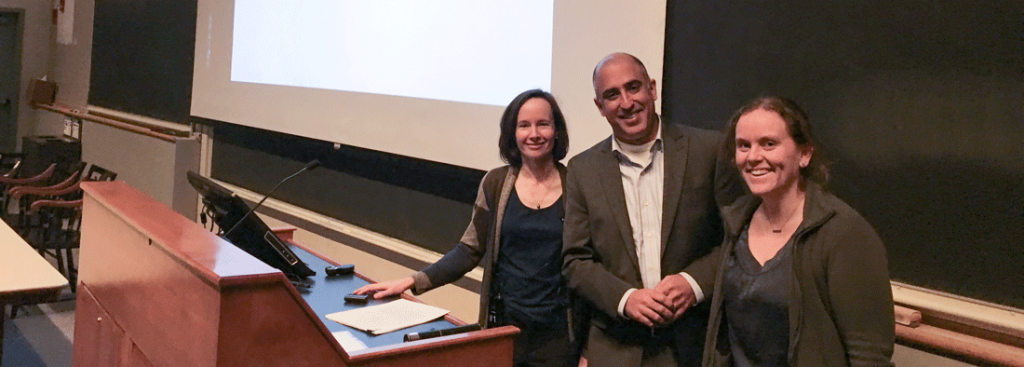Michael Chernew, guest lecturer at the Essentials of the Profession class, is speaking animatedly to two hundred medical and dental students about health insurance benefit design, using the experiences of Harvard post-docs as an example. “It’s hard to see why we want to charge post docs more to have babies. We love babies (and their parents), and babies come regardless of the copays,” he says.
The health policy track of the Esssentials of the Profession class, led by Haiden Huskamp and Ateev Mehrotra, is a core component of Harvard Medical School’s curriculum for first-year medical and dental students. In it, students rigorously study the U.S. health care system and key health policy concepts including the role of insurance, payment policy, benefit design, quality measurement and drivers of spending growth.
Mehrotra says, “This is a unique opportunity for medical and dental students to better understand what forces have driven the structure of the health care system in which they will practice for their careers.”
HMS is a member of the American Medical Association’s Accelerating Change in Medical Education Consortium, which emphasizes core, practical knowledge where students “learn to learn” combined with hands-on experience throughout all four years.
This can make the Essential of the Profession class both challenging and exciting to teach, according to tutor and teaching fellow Emma Sandoe. “It is different from some other Med School classes: the questions don’t necessarily have answers, you have to understand the needs and desires of stakeholders, and there’s an element of social science and theory.”
Nevertheless, she says, it can lead to interesting dialogue, as not even the teachers have all the answers. “Sometimes we’re asking the questions back to the students—it makes for interesting discussion.”
In addition to large group lectures, the smaller group sessions primarily explore case studies. It’s an interdisciplinary method that’s used in business and law classes, but here the focus is turned towards health policy. It helps the students get to those “ah-ha” moments faster—and helps them make sense of health care changes occurring in the real-time political landscape.
“Our goal is to give students the knowledge and skills they need to take better care of their patients and to help change aspects of the health care system that aren’t working once they start practicing,” says Huskamp.
It is also an opportunity for the students to interact on a more individual level with the faculty, many of whom are experts in their field and have hands on experience with the policies being discussed. For example, one tutor is Don Berwick, former administrator of the Centers for Medicare & Medicaid Services.
The class continues to innovate to respond to new methods of teaching and a rapidly changing health policy environment. This presents new challenges--but also new opportunities to engage students in critically important work.
Enjoy content like this? Sign up for our newsletter and follow HCP on Twitter.
